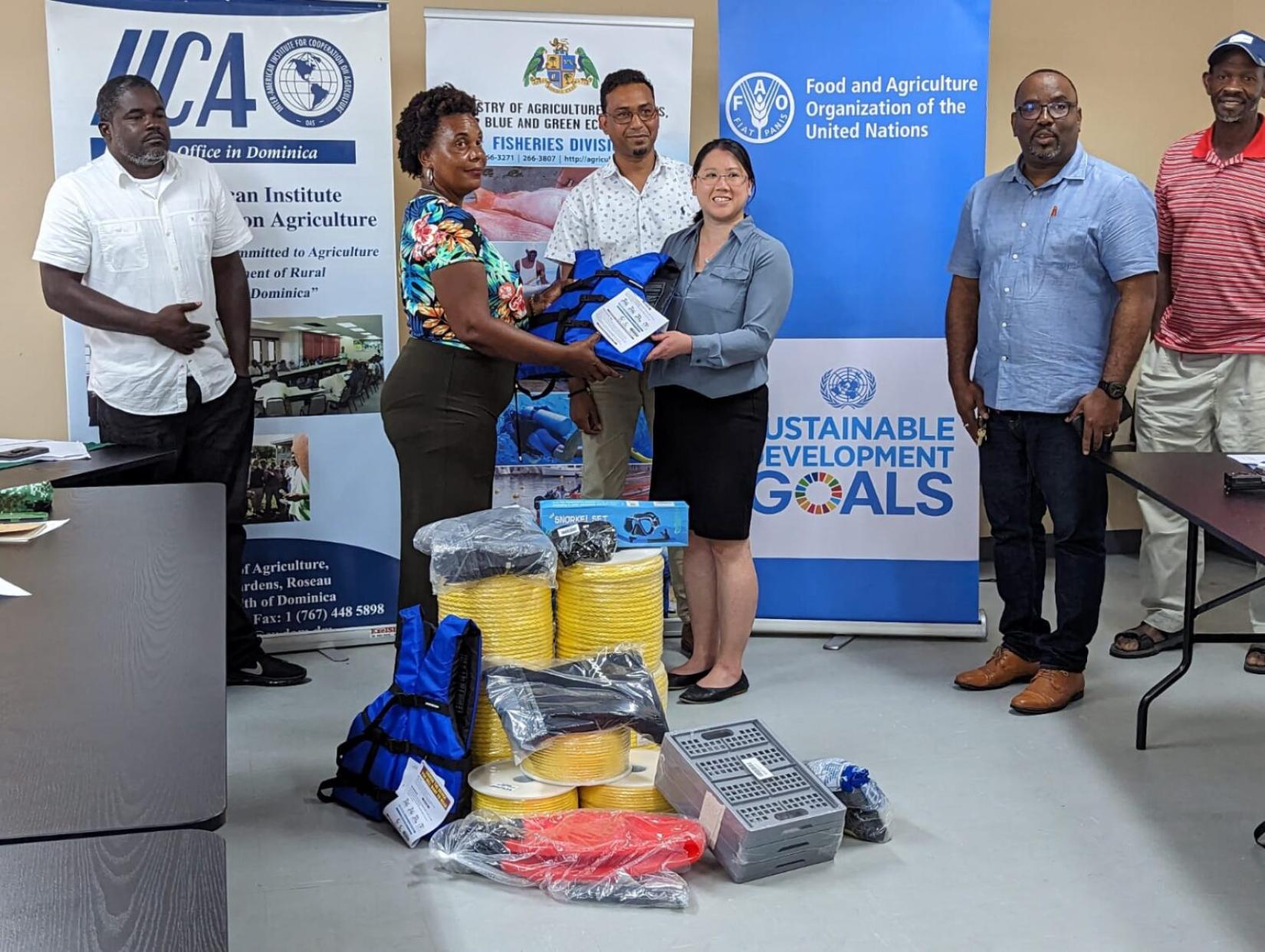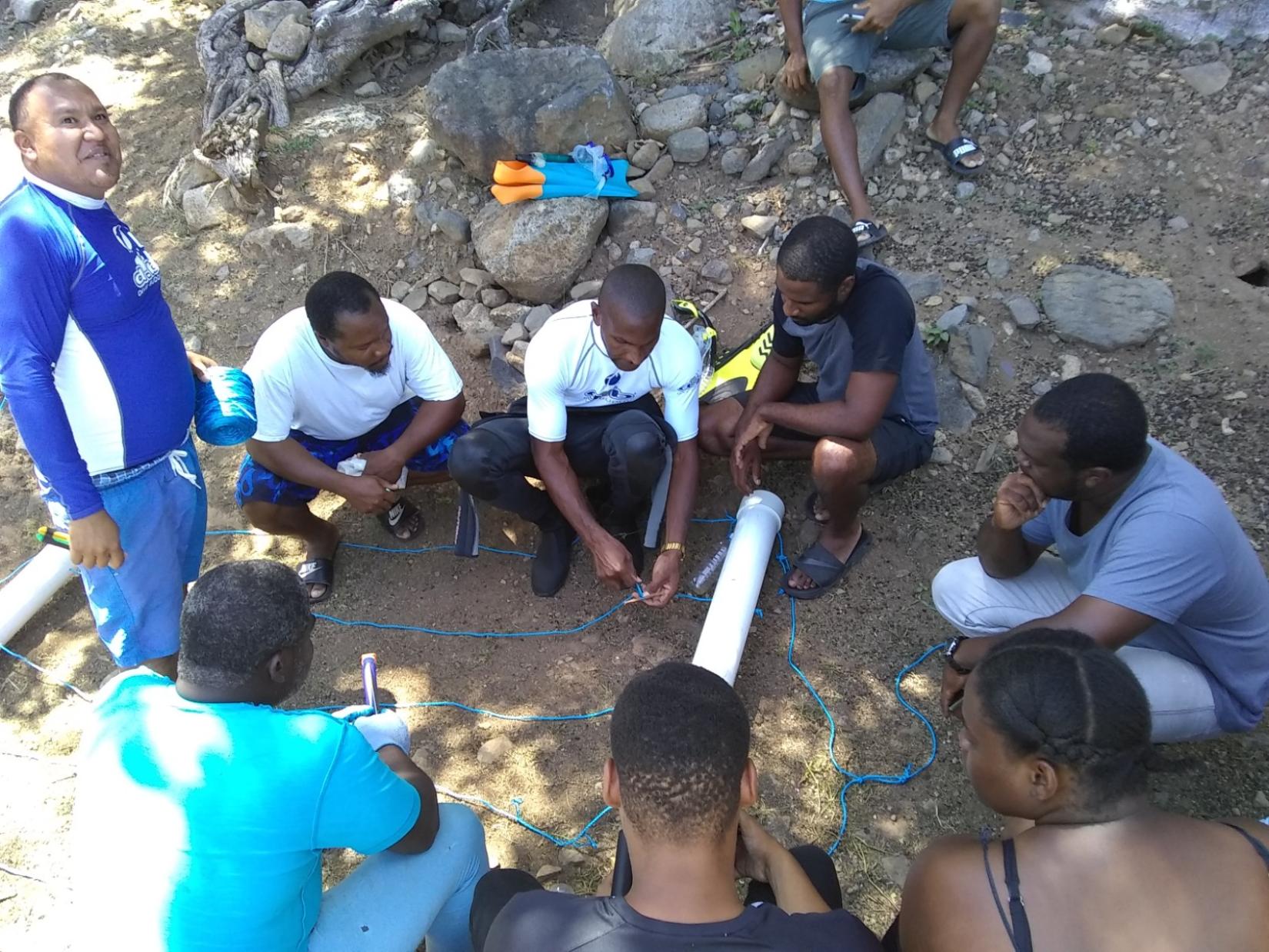Dominica gears up to improve local sea moss production and develop its sea moss sector
15 June 2023
Following a week of practical trainings on sea moss production and the validation of upgrading strategies for its sea moss sector, Dominica is gearing up to take charge of the local sea moss market.

Dominica is no stranger to sea moss and the benefits of the industry. For decades the country harvested the Gracilaria sea moss species from the wild but after introducing a more lucrative and fast-growing species of the algae, the Eucheuma Cottonii, the country has now set its course to increase local production and upgrade the sector to increase supply in the local market.
Classroom and practical trainings at sea and site suitability assessments kickstarted a week of actions to upgrade the sea moss sector in Dominica in May 2023. Spearheaded by the Food and Agriculture Organization of the United Nations (FAO), in collaboration with the Ministry of Agriculture, Fisheries, Blue and Green Economy and the Inter-American Institute for Cooperation on Agriculture (IICA), over 30 farmers, extension officers, and government representatives were trained in the sustainable and environmentally responsible production of sea moss. These included the Calibishie Sea moss Group, Wooty Sea moss Group and Grand Bay Sea moss Farmers Group, who are also currently involved in piloting the production of the Eucheuma sea moss variety. During the week, current and potential sites for sea moss production were also assessed, and the majority of these were deemed suitable and conducive for sea moss production and to support the expansion of production for new farmers.
During the week, farmers from several cooperatives were presented with tools and equipment to support sea moss farming. The week of trainings and site visits then culminated with a Stakeholder Validation Workshop with over 40 stakeholders, including sea moss farmers, agro-processors, business leaders and entrepreneurs, extension officers and other government representatives. The stakeholders engaged in discussions to validate the upgrading strategies for sea moss industry development, which featured presentations on the assessment and findings of Dominica’s sea moss value chain, cost of production, a review of the draft Upgrading Strategy, plenary and group discussions. By the end of the workshop, the stakeholders validated four strategic areas to transform the sea moss value chain into a sustainable, competitive, resilient, and lucrative industry. These include, to expand and improve efficiency of commercial production, develop a comprehensive research and development agenda for industry development, establish public-private partnerships to strengthen trade and marketing strategy and to develop the industry and strengthen value chain coordination, industry stewardship and the enabling environment.
Permanent Secretary in the Ministry, Mr Reginald Severin, highlighted during the workshop that:
"Sea moss is a game changer for Dominica and presents a great opportunity for social and economic development of the island”.
He mentioned that the Ministry would designate specific areas for sea moss production within the marine space of Dominica to address the issue of access and tenure and that they would increase resources for extension services and personnel for marine aquaculture. Mr Severin declared sea moss as a “transformative product and therefore is on the transformative agenda of the Government of Dominica”.
The development of Dominica’s sea moss industry has the potential to reduce a reliance of imported sea moss, offer a reliable source of income and thus improve livelihoods, and build further institutional and producer capacity.
Dr Renata Clarke, FAO Sub-regional Coordinator for the Caribbean noted during her remarks at the workshop that the “development of a Dominican sea moss value chain can provide economically viable opportunities for rural and coastal communities, increase food security, while simultaneously reducing Dominica’s import bill”.
As the demand for sea moss continues to grow regionally and internationally, this phase of the project remains an integral part of ensuring that production is consistent and that a resilient value chain for sea moss is successfully developed to enable the country to move towards the exportation of sea moss in the years to come.

Minister of State in the Ministry of Agriculture, Fisheries, Blue and Green Economy, Honourable Jullan Defoe, expressed during the workshop that the Government would wholeheartedly continue to support the development of the sector enabling it to transform to an industry to include non-food based and luxury commodities. He indicated that agriculture should contribute no less than ECD700 million to the Gross Domestic Product (GDP) by 2030 and that the Government intends to support the sector in the upcoming budget.
In closing, Hon. Defoe stated that “Sea moss production must be treated as a business at all costs to ensure its sustainability. Therefore, the Ministry will provide the start-up support but as the entities develop, the groups will be expected to capitalise the business venture”.
The week of trainings and meetings held in May fall under two projects of FAO’s Technical Cooperation Programme on Sustainable Development of Resilient Value Chains - Implementation of CARICOM COVID-19 Agri-Food Recovery Plan and the COVID-19 Agrifood Response for Sustainable Development of Competitive and Resilient Value Chains in support of the Hand-in-Hand Initiative.
Over the coming months, activities will focus on strengthening linkages between the private sector, such as agro processors and farmers, to promote long-term partnerships that can help in boosting investment into the sea moss sector and in enhancing the resiliency and sustainability of sea moss production in Dominica.






